Table of Contents
What you eat plays an important role in prostate function. But, to get the right balance, you need to understand good foods for prostate health, as well as the ten worst foods for prostate health.
So, keep reading to find out the ten worst foods for prostate health. We’ve included foods to avoid with an enlarged prostate. You’ll also learn more about ten foods that support the prostate, with delicious and simple recipes included.
Prostate and prostate cancer
The prostate is a small walnut-sized gland nestled beneath the bladder in men. It is crucial in reproductive health, urinary function, and hormonal balance. Many men aged 50 and above experience prostate problems. These can lead to symptoms such as pain and increased frequency of urination (1).
Prostate cancer is the second most diagnosed cancer in men. It is the fifth leading cause of cancer deaths (2, 3).
While prostate conditions (particularly cancer) are of concern, simple changes to diet can make a big difference. With that in mind, here are ten foods to avoid if you want to support prostate health.
Ten worst foods for prostate health
There is no one-size-fits-all approach to nutrition and health. Many experts suggest generally healthy eating protects against prostate problems (4). However, research shows some potentially bad foods for prostate function.
Here is the list of the top 10 worst foods for prostate health to help you stay well.
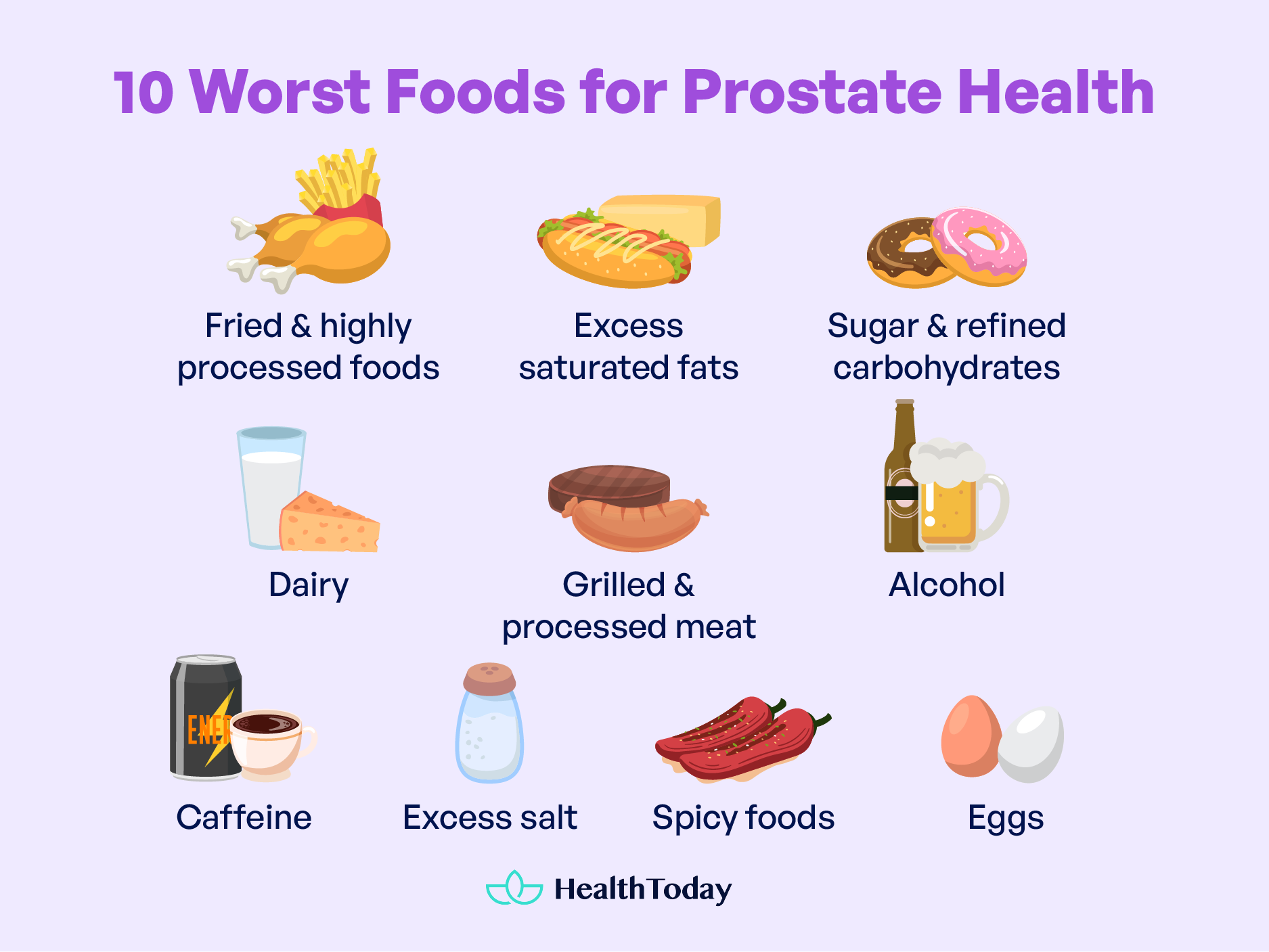
Fried and highly processed foods
At the top of the list of bad foods for prostate health are fried and highly processed foods (5). Research suggests fried foods are linked to a 35% increase in prostate cancer (6). This may be linked to the production of chemical compounds, such as heterocyclic amines and acrylamide, during frying. These compounds may be carcinogenic, but more research is needed (7, 8).
Excess saturated fats
If you’re consuming a lot of saturated fat, it may increase your risk of aggressive prostate cancer. Saturated fat from meat and dairy appear to be the most problematic sources (9).
Sugar and refined carbohydrates
Refined carbohydrates, such as white flour, baked goods, cereals, bread, and sugary snacks, are all high-glycemic foods. This means they can cause significant spikes in your blood sugar levels after eating. Elevated blood sugar may increase the risk of several cancers, including prostate cancer (10).
Dairy
If you consume high levels of dairy foods— more than five servings per week, you may be at higher risk of prostate cancer (11) compared to people who consume less than one serving per week. But your choice of milk may also be an important factor. Low-fat milk seems to be linked to the development of less serious prostate cancer. However, whole milk may increase the risk of aggressive forms of the disease and death (12).
Grilled and processed meat
Eating excessive amounts of processed red meat may increase your risk of prostate cancer (13). This may be due to heterocyclic amines in products like hot dogs, burgers, bacon, and deli meats. These chemicals may promote cancer growth.
Additionally, the risk of prostate cancer rises when you consume many grilled and well-done types of meat. As the development of heterocyclic amines increases with cooking time. Opt for red meat cooked at lower temperatures to reduce the risk (13).
Alcohol
Limited studies have explored the link between alcohol and prostate health, but drinking excess alcohol may lead to increasing your risk of prostate cancer— your risk of developing high-grade prostate cancer could triple if you consume seven or more drinks per week starting at a young age (14). Alcohol may also intensify urinary tract symptoms in those with prostate issues.
Caffeine
Caffeine is also a diuretic, increasing the urge to urinate and inducing dehydration. If you have a prostate condition, this can exacerbate symptoms and lead to discomfort. Caffeinated beverages include coffee, some herbal teas, sports drinks, and some sodas. However, coffee and green tea may have some protective benefits.
Excess salt
Frequent eating of salty foods may increase your risk of lower urinary tract and prostate-related symptoms (15). Sodium (in salt) is essential for maintaining water balance in the body. However, modern Western diets exceed the necessary intake. You can achieve optimal sodium consumption through natural sources like sea salt. So, avoiding salt-laden processed foods is the best way to improve prostate health.
Spicy foods
Spicy foods don’t elevate prostate cancer risk, but if you have existing prostate or urinary symptoms, consider avoiding hot sauces and chili peppers. These spicy foods may trigger inflammation and exacerbate discomfort (16).
However, it’s worth noting that antioxidant nutrients in spicy foods may support prostate health; thus, dietary decisions should always be personalized.
Eggs
Eggs are rich in choline, a vital component for various body functions. Yet, excess choline intake may increase prostate cancer risk by 70% (17). However, meat and milk are also high in choline and linked to prostate cancer risk for other reasons (10, 11, 12). Consider limiting overall choline intake to avoid eliminating any food group.
You don’t need to avoid all bad foods for prostate health and miss out on your favorite meals. It’s about balance. Consider cutting down on those that you may be consuming in excess and add plenty of foods good for prostate health.
Ten best foods for prostate health
So, what foods are good for prostate health? Luckily, there are lots of delicious options to choose from. We recommend including some foods from the list below in your daily meal. Also, we’ve even included some recipes for you to make it easier.
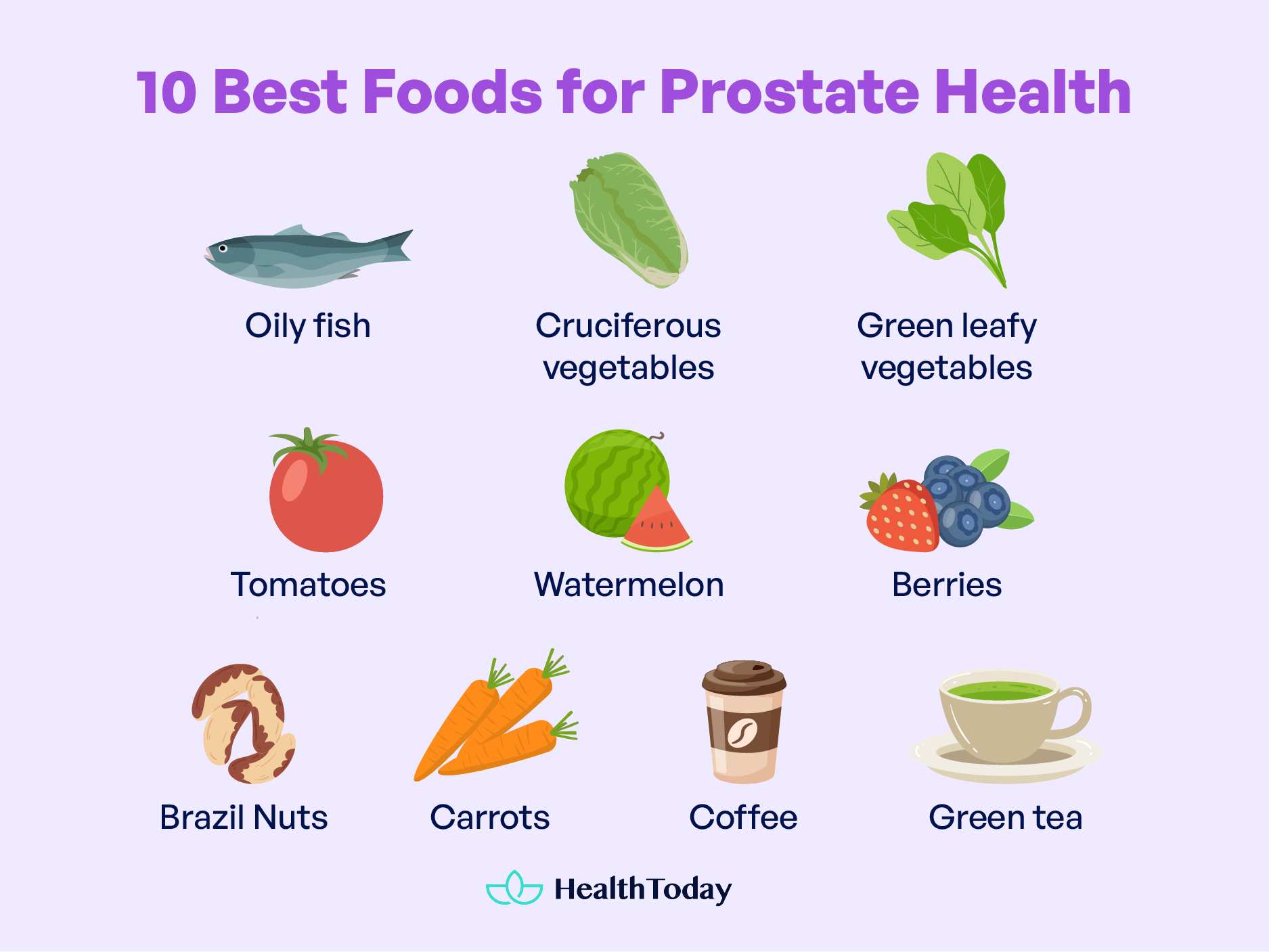
Oily fish
Switch some meat and chicken for oily fish like salmon, mackerel, and sardines. These are high in anti-inflammatory omega-3 fats, which support many organs, including the prostate (18).
Cruciferous vegetables
For prostate health, add Brussels sprouts, broccoli, cabbage, or cauliflower into your daily diet. These vegetables are rich in sulforaphane, a compound associated with reduced cancer risk (19). Animal studies found that consumption of broccoli sprouts may reduce the prevalence and severity of prostate cancer (20).
Green leafy vegetables
These include kale, spinach, collard and mustard greens, romaine lettuce, and watercress. Green vegetables are low-glycemic and contain micronutrients that decrease the risk of prostate cancer (21). A portion of steamed or stir-fried green vegetables makes a great side dish, or you can add a handful of kale or spinach to morning smoothies.
Tomatoes
Tomatoes contain high levels of the antioxidant ‘lycopene.’ Increased consumption of lycopene has been linked with a reduced risk of prostate cancer (22). If you want to pack a lycopene punch, opt for cooked and canned tomatoes, which offer the most benefit (23). We’ve included a recipe for a delicious homemade tomato sauce below.
Please note that the acidity of tomatoes may exacerbate bladder function in certain individuals. So, it’s important to keep an eye on your symptoms and seek professional advice if necessary.
Watermelon
If you’re looking for an alternative lycopene source, watermelon can be a great option. It makes a great snack but can also be delicious on a salad with feta cheese, green leaves, and mint.
Berries
A bit of an all-around ‘superfood,’ berries are a great choice if you want to support all systems of the body. This is due to the antioxidant nutrients they contain, including ‘anthocyanins.’ These anti-inflammatory compounds exert many anti-cancer and health-promoting properties (24). Berries add color and flavor to smoothies, snacks, desserts, breakfast oats, and granola.
Brazil nuts
Brazil nuts are high in selenium. This mineral is associated with a reduced risk of many cancers, including prostate cancer (25). A small handful of Brazil nuts with berries makes a delicious prostate-friendly snack.
Carrots
While more research is needed, daily carrot consumption may reduce the risk of prostate cancer (26). In fact, for every 10g increase in daily carrot consumption, your risk of prostate cancer may fall by around 4-5%. That’s got to be worth adding to your main meal or even enjoying a carrot or two with your favorite dip.
Coffee
We know – caffeine appeared on the worst foods for prostate health list, but bear with us. Not all caffeinated drinks are created equal! Coffee is high in antioxidants. These nutrients may provide cancer-protective benefits (27). Switching to organic coffee will also reduce exposure to pesticides in coffee that may be carcinogenic (28).
Green tea
Green tea is well known for its potential cancer-protective properties. And it has been linked to a lowered risk of prostate cancer (29). Yet, it also contains caffeine. Therefore, if you have existing prostate issues, you may need to limit consumption and focus on other foods listed above.
Top 5 recipes to improve prostate health
Whatever your food preferences you’ll find something to tempt your taste buds in these 5 recipes. Enjoy!
Salmon salad
For a quick, simple, and light lunch or dinner option that packs a flavor punch, this could be for you.
(Almost) One-pot sweet potato, tofu and spinach curry
If you can handle the spices and are looking for a warming taste explosion, this recipe is for you. This hearty plant-based curry not only includes foods good for prostate health but also helps you keep meat consumption down without compromising on flavor.
Dairy-free spinach soup
Dairy-free and packed with green goodness soup is quick and easy to make. It can also be frozen for days when you need something instant and nutritious.
Prostate super juice recipes
If you like a nutrient boost first thing in the morning, opt for this prostate-friendly smoothie. These two options are packed with fruits and vegetables that will help put a spring in your step nice and early.
Homemade tomato sauce recipe
Tomato sauce is a staple in many kitchens that often pairs with pasta, meat, and chicken. However, commercial sauces can be filled with unwanted additives and added sugars. So, why not whip up a batch of this delicious 30-minute sauce and store some in your freezer for a quick midweek meal?
Is banana good for enlarged prostate?
Yes, bananas can benefit an enlarged prostate, as they are a good source of nutrients like vitamin C, potassium, and fiber.
What is the best vegetable for the prostate?
All vegetables contain an abundance of micronutrients that support prostate health. However, green leafy and cruciferous vegetables are particularly beneficial, including broccoli, cabbage, cauliflower, Brussels sprouts, kale, spinach, and mustard greens.
Is drinking a lot of water good for your prostate?
Yes. Staying hydrated is good for prostate health, as it supports urinary function and helps prevent potential symptoms.
What are the five warning signs of an enlarged prostate?
The five warning signs of an enlarged prostate include increased frequency of urination, urgency to urinate, difficulty starting or maintaining a steady stream of urine, a weak urine stream, and the feeling of incomplete bladder emptying. Consult with a healthcare professional if you are experiencing these symptoms.
Can an enlarged prostate go back to normal?
Lifestyle changes, medications, and other interventions can help manage symptoms of an enlarged prostate. However, the condition itself does not generally revert to normal. It is a progressive condition, and the goal of treatment is often to reduce symptoms and improve quality of life.
Summary
There are plenty of foods for prostate health that are easy to find, such as Cruciferous vegetables, oily fish, berries, tomatoes, watermelon, green leafy vegetables, carrots, and coffee. To prevent prostate issues, it is important to increase these foods in your diet. However, it is also vital to avoid the worst foods for the prostate.
We’d love your feedback on foods you have found helpful for supporting prostate health and your favorite ways to get them into your diet.







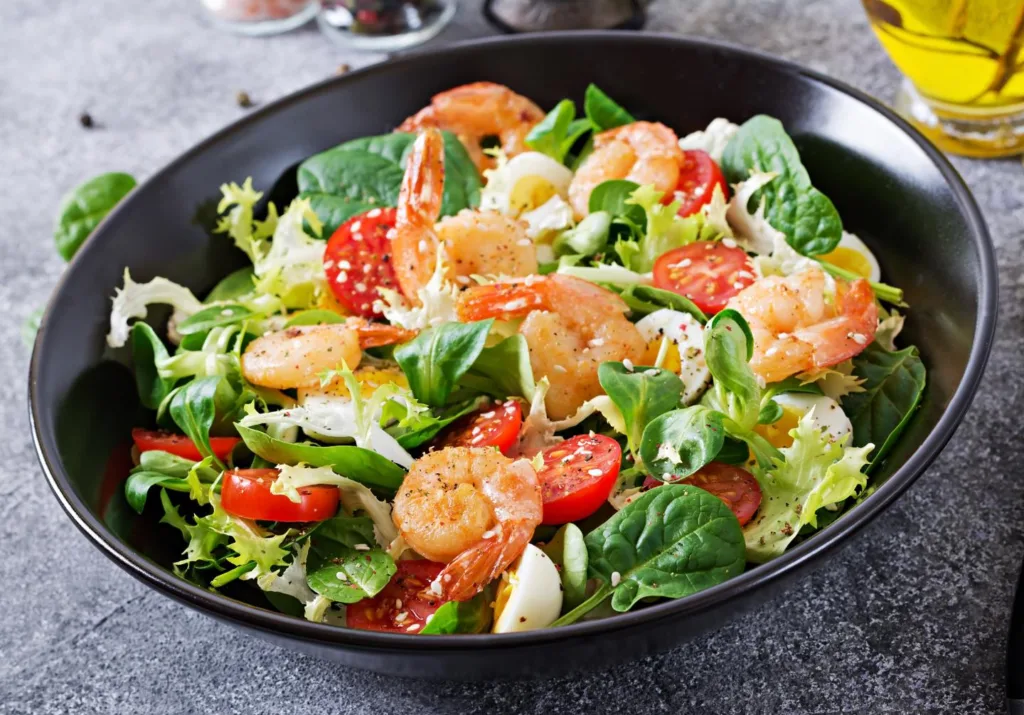

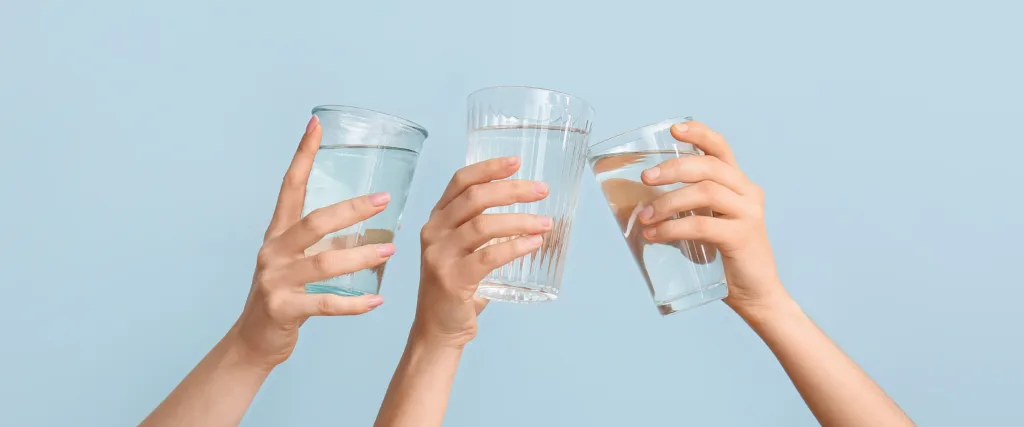
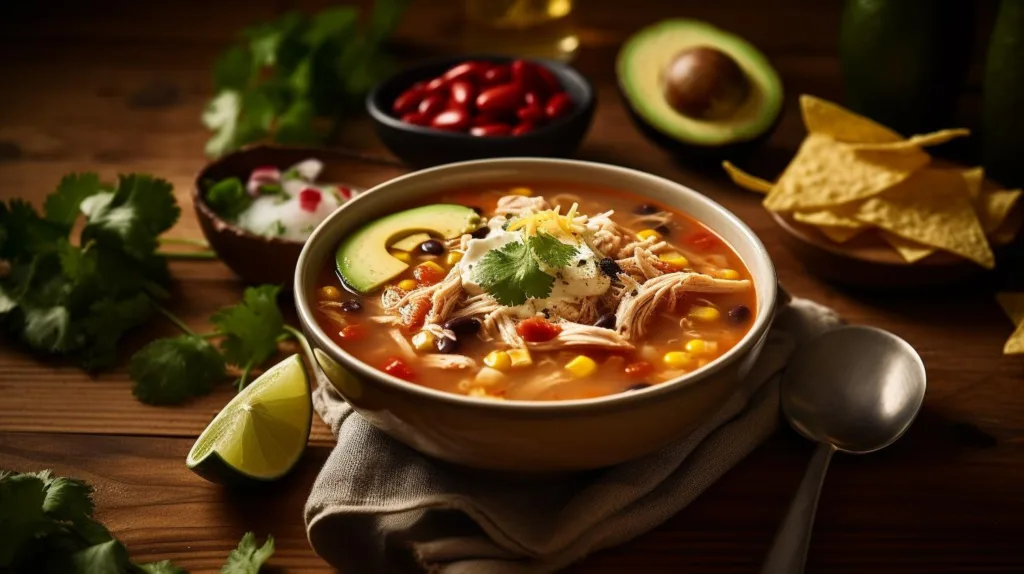


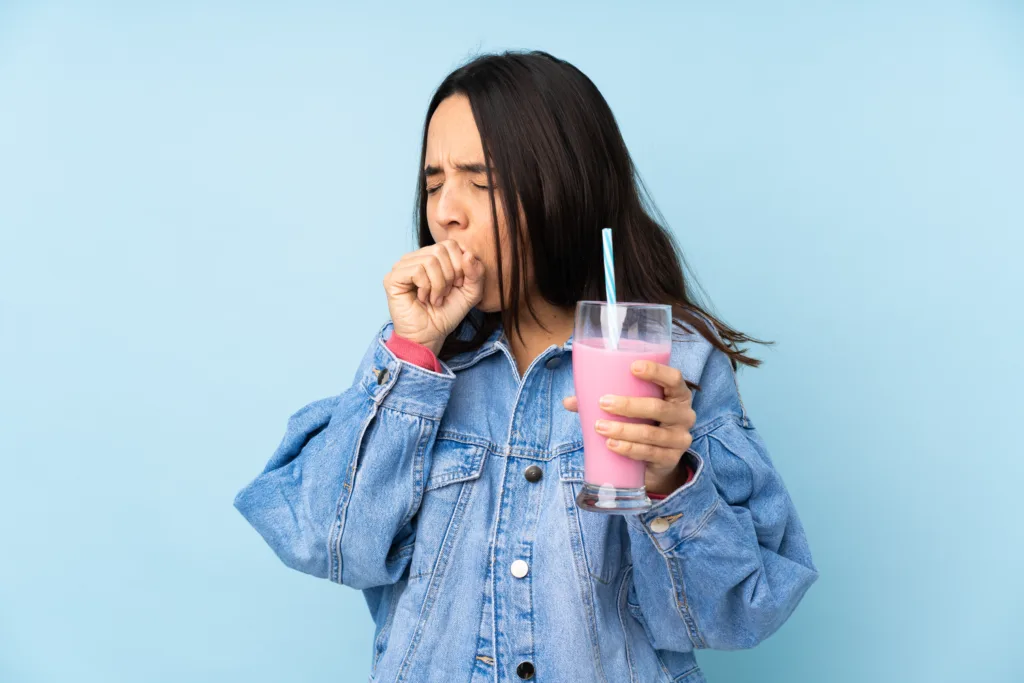
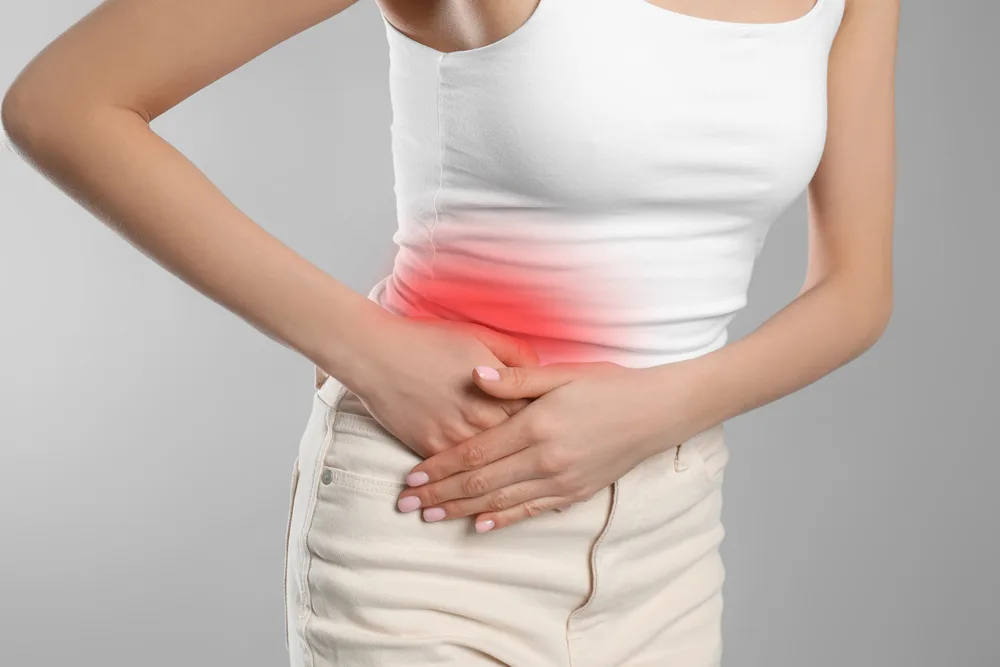

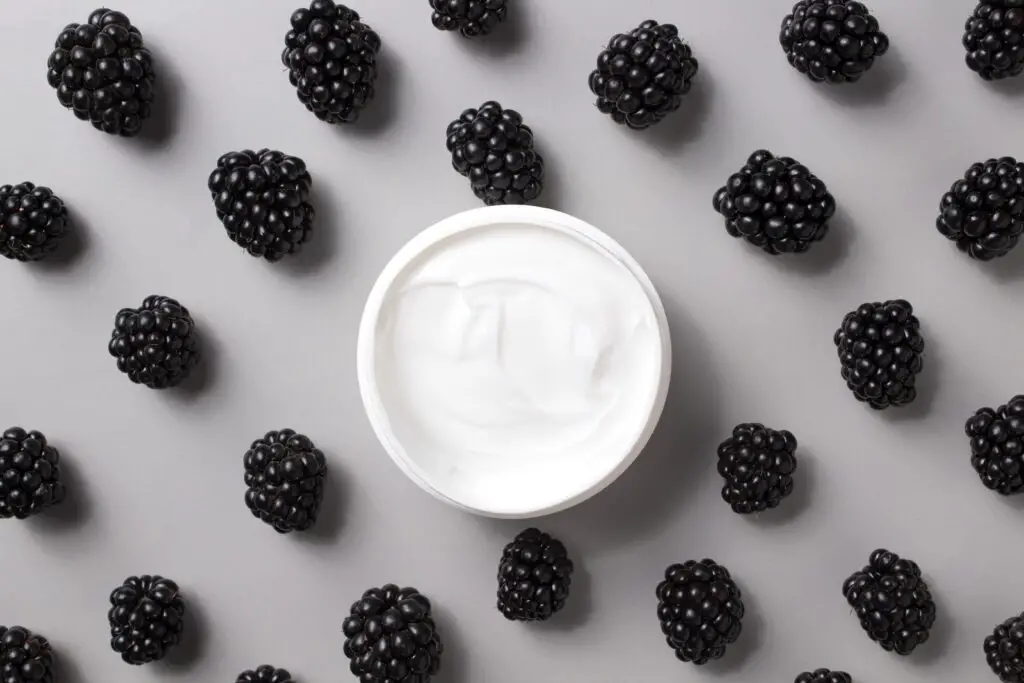
Comments
0